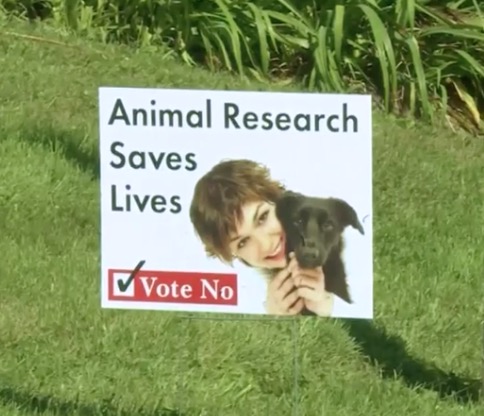There’s no shortage of news coverage of the midterm elections. However, with all the drama in D.C., America’s research community may be unaware of a ballot initiative in one small Wisconsin community which may one day have national implications.
 The residents of Mount Horeb, a community outside of Madison, will soon vote on a referendum seeking to amend a current village ordinance which applies to “Public Nuisances Offending Morals and Decency.” Under current law, gambling machines, the sale of unlicensed alcohol products and illegal drinking are all forbidden. A Wisconsin-based animal rights group named Dane4Dogs is seeking to expand the ordinance further. Here’s their proposed language:
The residents of Mount Horeb, a community outside of Madison, will soon vote on a referendum seeking to amend a current village ordinance which applies to “Public Nuisances Offending Morals and Decency.” Under current law, gambling machines, the sale of unlicensed alcohol products and illegal drinking are all forbidden. A Wisconsin-based animal rights group named Dane4Dogs is seeking to expand the ordinance further. Here’s their proposed language:
The following acts, omissions, places, conditions and things are specifically declared to be public nuisances offending public morals and decency: (5) RESEARCH DOGS/CATS. (a) Any place or premises where cats or dogs are possessed for the purpose of taking or sending the cat or dog outside the village to be used for any medical, surgical, or chemical investigation, experiment, research or demonstration OR (b) any place or premises where cats or dogs are used for medical, surgical or chemical investigation, experiment, research or experimentation involving pain or distress to the animal.
Dane4Dogs claims, without evidence, that animal studies are no longer needed. They say thanks to technological advancements, alternatives are currently available to replace all animal-based research. The claim is patently false. Furthermore, animal studies are a required step in the FDA’s approval process for new medications and medical devices.
Activists had a specific organization in mind when they crafted their proposed legislation for Mount Horeb. Ridglan Farms, one of a handful of U.S. facilities which breeds dogs for biomedical research, sits nearby. And while most Americans – including the research community – are rightly conflicted when it comes to studies in dogs, their important role in advancing both human and veterinary medicine is undeniable. Insulin, a Nobel Prize-winning breakthrough, was first discovered in dogs. Rabies vaccine was developed via canine research. Dogs have also helped combat heart disease and they are providing key findings to aid understanding and treat muscular dystrophy. In the midst of all these advancements, our universal appreciation for dogs has only grown. It’s one of the leading reasons why we only study them when necessary. Less than .05 percent of animal research takes place in canines.
 When activists initially proposed Mount Horeb’s anti-animal research legislation, it’s believed they mistakenly assumed the ordinance would impact Ridglan Farms. It does not. The facility is not within village city limits. However, the referendum still raises significant concerns. It could serve as the template for similar local laws across the United States – regulations meant to impede biomedical progress by appealing to our universal love of animals while at the same time, misleading well-meaning voters.
When activists initially proposed Mount Horeb’s anti-animal research legislation, it’s believed they mistakenly assumed the ordinance would impact Ridglan Farms. It does not. The facility is not within village city limits. However, the referendum still raises significant concerns. It could serve as the template for similar local laws across the United States – regulations meant to impede biomedical progress by appealing to our universal love of animals while at the same time, misleading well-meaning voters.
This localized approach for disrupting health research may seem like a new strategy. It’s not. Animal rights groups recognize it is much easier to push legislation at the local level. Those attending the 2018 National Animal Rights Meeting report there was a heavy emphasis on crafting regional legislation. In fact, a template for this strategy already exists. The first “Beagle Freedom Bill” was passed in Minnesota in 2014. The legislation requires science organizations to offer healthy dogs and cats for adoption once their involvement in research ends. While these laws sound like a good idea, many duplicate adoption programs already in place and at times, they can create unnecessary red tape. The legislation was initially proposed by the Rescue + Freedom Project (formerly the Beagle Freedom Project) a group of animal rights activists, many with extreme views.
RFP portrays itself as an adoption agency which finds new homes for a variety of animals, including dogs and cats that previously lived in labs. Many, including those in the science community, support the rehoming of research animals whenever possible. However, unlike other adoption groups, RFP uses its platform to promote an anti-research agenda, falsely portraying animals in labs as being universally mistreated.
Speaking of Research predicts that if efforts in Mount Horeb are successful, similar initiatives will soon arise in communities across the United States. Therefore, we urge research organizations to closely monitor this local ordinance. We also advocate for science institutions to communicate regularly with local lawmakers and their communities about the role of animal studies in continued medical progress, including those that take place in dogs.
Update 11/7/18: The referendum failed, with a vote of 59% (2,273 votes) against expanding the ordinance to effect a ban and 41% (1,591 votes) in favor of the ordinance change Dane4dogs supported.

The FDA who helped create the current drug epidemic. Or perhaps you’re testing viagra or obesity drugs on dogs?! Animal testing needs to stop. It’s imhumane and irrelevant. I’m sure you’re not a pet owner.
There’s a lot to unpack here.
The opioid epidemic was caused by a number of parties: physicians, patients, the FDA, pharma, etc.
Also, it’s interesting that you selectively pick only two advancements that happen to involve animal studies. How about transplants, cancer treatments and vaccines? Are you not supportive of those? Last year’s Nobel Prize was awarded for the development of immunotherapy to battle cancer. That research involved pivotal studies in mice. Are you against that as well?
As for the obesity epidemic…interesting that you picked that. It’s one of the most serious health issues Americans currently face. Do you know anyone who chose to be obese? I doubt it. The reality is that there are several factors including genetics, socio-economics and others at play here. It’s a complex issue and we’re not all wired the same.
Finally, it’s entirely possible for people to both love animals and at the same time, recognize that many scientific advancements require animal research. The world is not a black and white place and we should reject all silly arguments that try to paint complex issues as simple binary choices.
I greatly appreciate that pigs were the source of porcine insulin for decades and the source of mitral valves for humans needing heart surgery. We thank Researcher’s for their quest to find innovations in medicine and medical devices.
hey.. animal research helps ANIMALS too .. keep up the good work..
Activists say animal research is outdated because now supercomputers running state-of-the-art software can be used to test new drugs.
Hmmm.
The most advanced computers in the world can’t accurately predict the weather.
I seriously doubt they can accurately predict everything a new drug will do once inside me.
Promoting dogs used in research because it required by the fda is flawed logic and allows for activists to male valid points. The fda isn’t the know-all, end-all be-all entity. As any well versed person not even activist can point out there are some serious flaws to the fda and the policy that a non-rodent species must be used. You are opening up the fact that many fda safety studies fail being transferred from non-human animal to human animal. The drug studies as a whole have a enormous failure rate etc.. saying “well support dogs in research because the fda says so”, activists will say well screw the fda and I would agree
The FDA’s regulatory requirements are only one of many reasons why animal studies are necessary and irreplaceable. However, since you bring it up, what alternative do you suggest for safety testing before we offer medications and treatments to the public?
Also the “failure rate” of drug approvals is an often-used and highly misleading piece of animal rights propaganda. We’ve written about it in the past in this post. Nine out of ten Statistics are taken out of Context – Speaking of Research
Actually I have regularly heard people refer to the failure rate when not talking about animal rights but in research in general. Anyone who knows research, works in research, is familiar with research is very well aware of this problem. It is a problem.
We certainly would all like a higher rate of success in developing new treatments. But this not a problem specifically tied to animal studies. The issue here is that activists wrongly claim low drug approval rates are tied to only one factor: animals. That statement is tremendously misleading.
The point is not that animal research is the only problem with translation. The point is that animal research rarely contributes anything of value in the preclinical process. If it doesn’t work, get rid of it. And it doesn’t work.
“Animal research rarely contributes anything of value in the preclinical process”?
You can’t be serious! As a physician, surely you are aware of the countless instances where animal studies have provided a fundamental understanding of biological systems, identified new treatment targets or played a key role in translating cell-level data into treatments that benefit humans and animals.
Please explain to us how this process continues to work if animals cannot be used in basic science research and/or therapeutic development.
While we are at it, please explain why you are right and so many health experts – including several Nobel Prize winners – are so wrong?
PS: This previous Speaking of Research post provides a little background on the organization, Physicians Committee for Responsible Medicine, which Dr. Pippin represents.